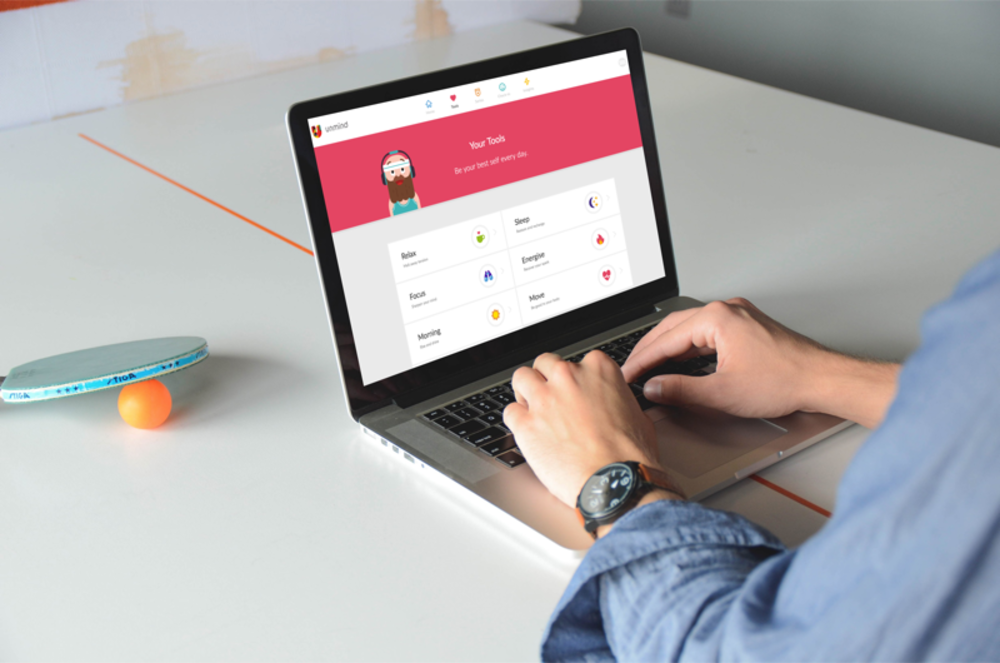Putting mental health first at work

Driven by a desire to put mental health on the business agenda, Unmind has established itself as a leading digital workplace mental health platform. With a number of leading brands signed up, founder Dr Nick Taylor tells us why everybody should be taking care of their mental health - not least startup founders.

Tell us about an important statistic surrounding mental health?
In the workplace, one in six people have a diagnosable mental health problem, most commonly stress, anxiety or depression. But many of these people are not receiving the appropriate support to help them on the road to recovery. One of the biggest challenges is that that an estimated nine out of ten people with a mental health problem in the workplace won't tell their employer about it, and this creates a real barrier to accessing support. This ultimately leads to a lot of people suffering in silence.
Mental health problems are the leading cause of absenteeism and presenteeism in the workplace. If people are struggling with their mental health it will impact on their ability to engage and get the most out of their work and their job.
Are mental health concerns on the rise or are we just talking about it more?
Potentially it's both. I think that we are talking about it more which is very positive. The stigma is starting to go and more and more people are sharing their own experiences, which is an amazing trend. It will lead to it being OK to discuss it in public in the same way that physical health is. Hopefully this will result in more people receiving the professional support they need rather than living in silence.
However, I also think there are reasons to believe that aspects of the modern world are contributing to an increase in mental health problems. We've been through a very tough period in our society and we know mental health is negatively impacted on by stress. Equally we live in a very busy world with lots of commercialism, detachment from nature and somewhat of a bleak global situation, so there are other reasons why people can feel worried or downhearted about things.
Are attitudes towards mental health changing in the workplace and if so, how?
We've seen a tremendous rise in the number of conversations around mental health and the workplace. People are now really recognising that's it's a significant issue to consider and something that is really affecting the workplace. We go to conferences around employee benefits and the topic of conversation is so often around mental health. It's a real strong trend at the moment.
The 'sleep faster' start-up culture is seen as putting entrepreneur's mental health at risk. Do you think entrepreneurs are more susceptible to mental health problems?
People who are entrepreneurs and in the startup world can be at greater risk of developing mental health problems. There is a huge amount of expectation and pressure to be the best, to exceed everything that's gone before, to grow very fast and to deliver a "world class product" and I think that just naturally puts a lot of pressure on people. There are also a lot of unknowns in the startup world and unknowns are stressful. We know that having a sense of control over your environment is a really good thing for good mental wellbeing and sometimes this can get a bit lost in the busy world of start-ups.
What things can we do to improve our mental well-being?
We all brush our teeth twice a day, we exercise at least a couple of times a week - be it just a walk or a run, but with our mental health we don't often have the same level of routine care going on.
We can do very simple things, such as ensuring we have a good night's sleep, making time to connect with people and by being mindful. There's a real buzz around mindfulness at the moment but really when you break down what mindfulness is, it's essentially being in the present moment and noticing the things around you in a non-judgemental way - such a great skill to develop. We're so often ruminating about the things in the past or worrying about things in the future that we forget the things that are going on in the here and now. I also think that as a society learning about mental health is an important thing to do.
We can recognise when we have a problem with our teeth, when we break a leg and we need to go to the doctor, but it's really important to understand what are the symptoms associated with common mental health problems such as stress, anxiety and depression. Have you noticed them? Taking good self-care when you notice that you're getting more anxious, knowing that there are support networks around you and knowing what that might mean and how to counter it.
What we're doing with Unmind is essentially giving people a mental health platform which is almost like a companion to their minds – a place where they can go day in, day out – there are daily tools and series that can help, wherever users might be on the spectrum of mental health there is something available and relevant to them.
What's the idea behind Unmind?
Unmind offers positive proactive mental health support in the workplace. Our goal is to create healthier, happier people and healthier happier organizations. We offer tools, learning and development series that can be used on a day-in day-out basis that will improve users mental health, allowing us to be stronger and better. We offer support for mental health problems at a much earlier stage than traditional models. The platform is designed to cover the whole spectrum of mental health, from problems to thriving.
Ultimately we are fascinated by the potential for digital health. From AI to apps to biotech it's all really exciting.

What's the content based on?
Our content draws on four scientific pillars – neuroscience, positive psychology, the latest form of cognitive behavioural therapy and mindfulness. We're constantly talking and working with top professors from the top Universities around the world, to make sure what we are doing is in line with evidence, and at the cutting edge of what is possible. Ultimately, clinical validity is super-important to us.
What's your background?
I spent over 10 years working in the health service, most recently leading a health team as a Clinical Psychologist. One of the obvious things about the National Health Service - which I love and have so much respect for - is that it's under-resourced in terms of time, human resource and money meaning it is often not able to effectively offer early intervention and proactive mental health care. My desire to form unmind was born of those experiences.
Have you had any personal experiences with mental health?
I've never personally had a clinically significant mental health problem, so I've never had an episode of depression or anxiety. However as with every other person in the world, I have my own mental health and that's reflected by what's going on in my life and how I'm feeling. I'm acutely aware of how my mental health can be affected by the workplace and stress in the workplace. One in four people have a diagnosed mental health problem – and through my clinical work I have a lot of experience meeting and working with people with mental health problems.
What's the most important thing you're working on right now and how are you making it happen?
One thing for us is to ensure that all the partner organisations who are working with us feel that we are providing a comprehensive and clinically valid platform for their employees giving them the best opportunity to thrive.

You may also like:
This content has been created for general information purposes and should not be taken as formal advice. Read our full disclaimer.



